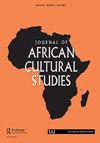“That Is Still our Tradition but in a Modern Form, but it Still Tells our Story”: Transitions in Buildings in Northern Ghana
IF 0.9
2区 社会学
Q2 CULTURAL STUDIES
引用次数: 0
Abstract
ABSTRACT Traditional building practices, which are typically regarded as repositories of heritage and material culture, are undergoing significant transitions in northern Ghana. This transition is evident in the use of building materials other than locally accessible traditional materials. These transitions are driving creativity and innovation as households strive for continuity of tradition, while at the same time ensuring the sustainability of their buildings. This article analyses the architectural traditions and building practices in northern Ghana using the building work and commentaries of the people of Gbabshe in peri-urban Tamale as a case study. The results show that building practices are transitioning because of environmental changes, migration, wealth accumulation and access to modern building materials and technology. As the peri-urban community becomes urbanised, the people encounter “modern” building styles which are appropriated into their traditional architecture, resulting in a hybridisation of architecture. The innovative tendencies and philosophical continuities of these builders, and the desire to achieve sustainable buildings and the hybridisation of architecture, has implications for the future of earth buildings’ relevance, resilience, sustainability, and sociocultural significance in people’s everyday lives.“这仍然是我们的传统,但以现代的形式,但它仍然告诉我们的故事”:加纳北部建筑的转变
传统的建筑实践,通常被认为是遗产和物质文化的宝库,在加纳北部正在经历重大转变。这种转变在建筑材料的使用上很明显,而不是当地可获得的传统材料。随着家庭追求传统的连续性,这些转变正在推动创造力和创新,同时确保其建筑的可持续性。本文分析了加纳北部的建筑传统和建筑实践,并以塔马利城郊的gabbshe人民的建筑工作和评论为例进行了研究。结果表明,由于环境变化、移民、财富积累以及获得现代建筑材料和技术,建筑实践正在发生转变。随着城市周边社区的城市化,人们遇到了“现代”建筑风格,这些建筑风格被挪用到他们的传统建筑中,导致建筑的混合。这些建筑者的创新倾向和哲学连续性,以及实现可持续建筑和建筑混合的愿望,对未来土建筑在人们日常生活中的相关性、弹性、可持续性和社会文化意义都有影响。
本文章由计算机程序翻译,如有差异,请以英文原文为准。
求助全文
约1分钟内获得全文
求助全文
来源期刊

Journal of African Cultural Studies
Multiple-
CiteScore
1.70
自引率
10.00%
发文量
13
期刊介绍:
The Journal of African Cultural Studies publishes leading scholarship on African culture from inside and outside Africa, with a special commitment to Africa-based authors and to African languages. Our editorial policy encourages an interdisciplinary approach, involving humanities, including environmental humanities. The journal focuses on dimensions of African culture, performance arts, visual arts, music, cinema, the role of the media, the relationship between culture and power, as well as issues within such fields as popular culture in Africa, sociolinguistic topics of cultural interest, and culture and gender. We welcome in particular articles that show evidence of understanding life on the ground, and that demonstrate local knowledge and linguistic competence. We do not publish articles that offer mostly textual analyses of cultural products like novels and films, nor articles that are mostly historical or those based primarily on secondary (such as digital and library) sources. The journal has evolved from the journal African Languages and Cultures, founded in 1988 in the Department of the Languages and Cultures of Africa at the School of Oriental and African Studies, London. From 2019, it is published in association with the International African Institute, London. Journal of African Cultural Studies publishes original research articles. The journal also publishes an occasional Contemporary Conversations section, in which authors respond to current issues. The section has included reviews, interviews and invited response or position papers. We welcome proposals for future Contemporary Conversations themes.
 求助内容:
求助内容: 应助结果提醒方式:
应助结果提醒方式:


